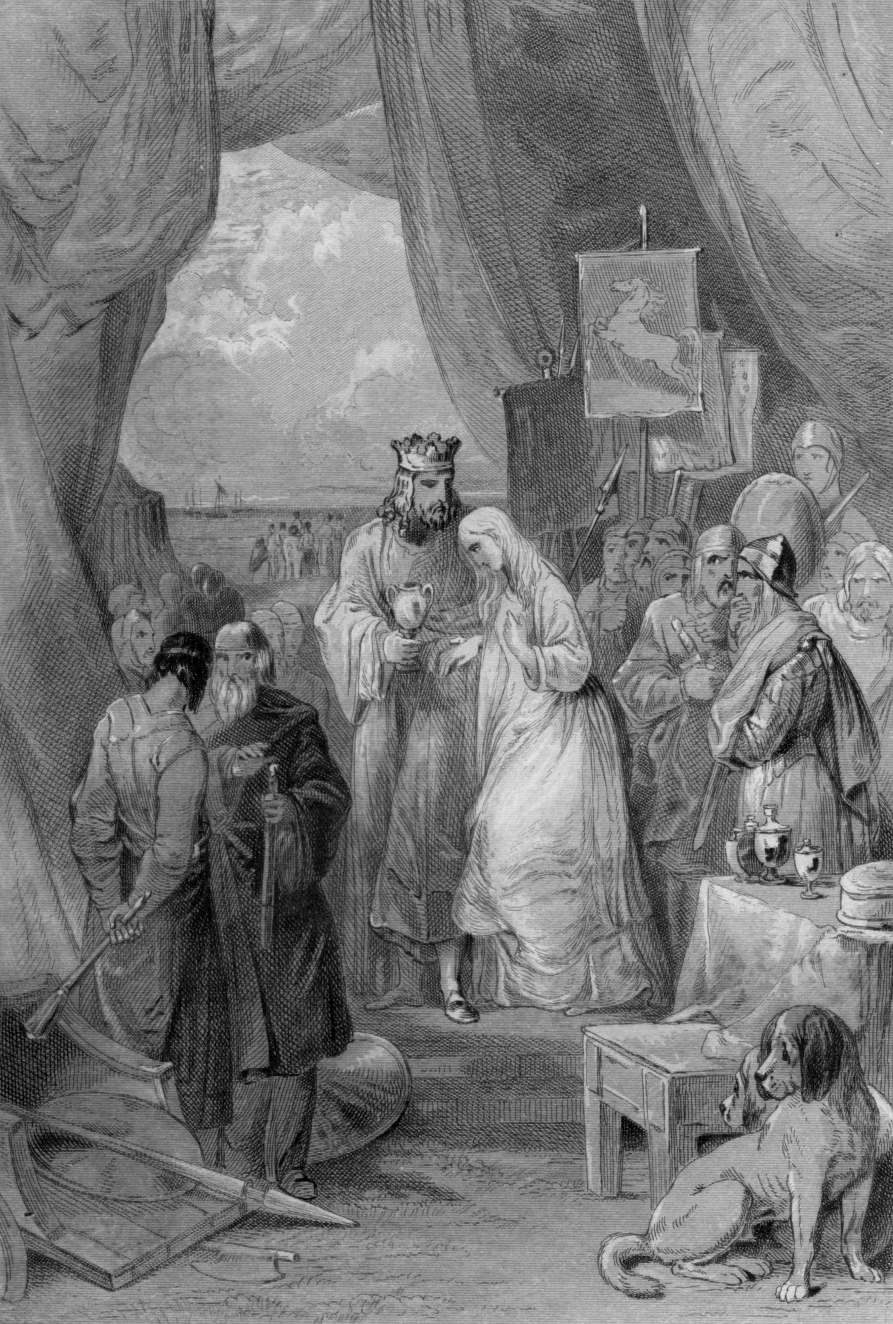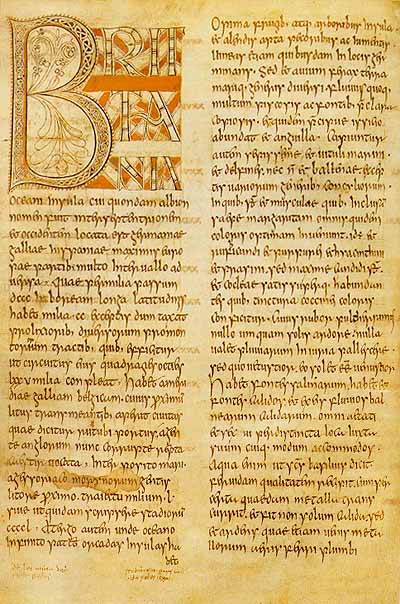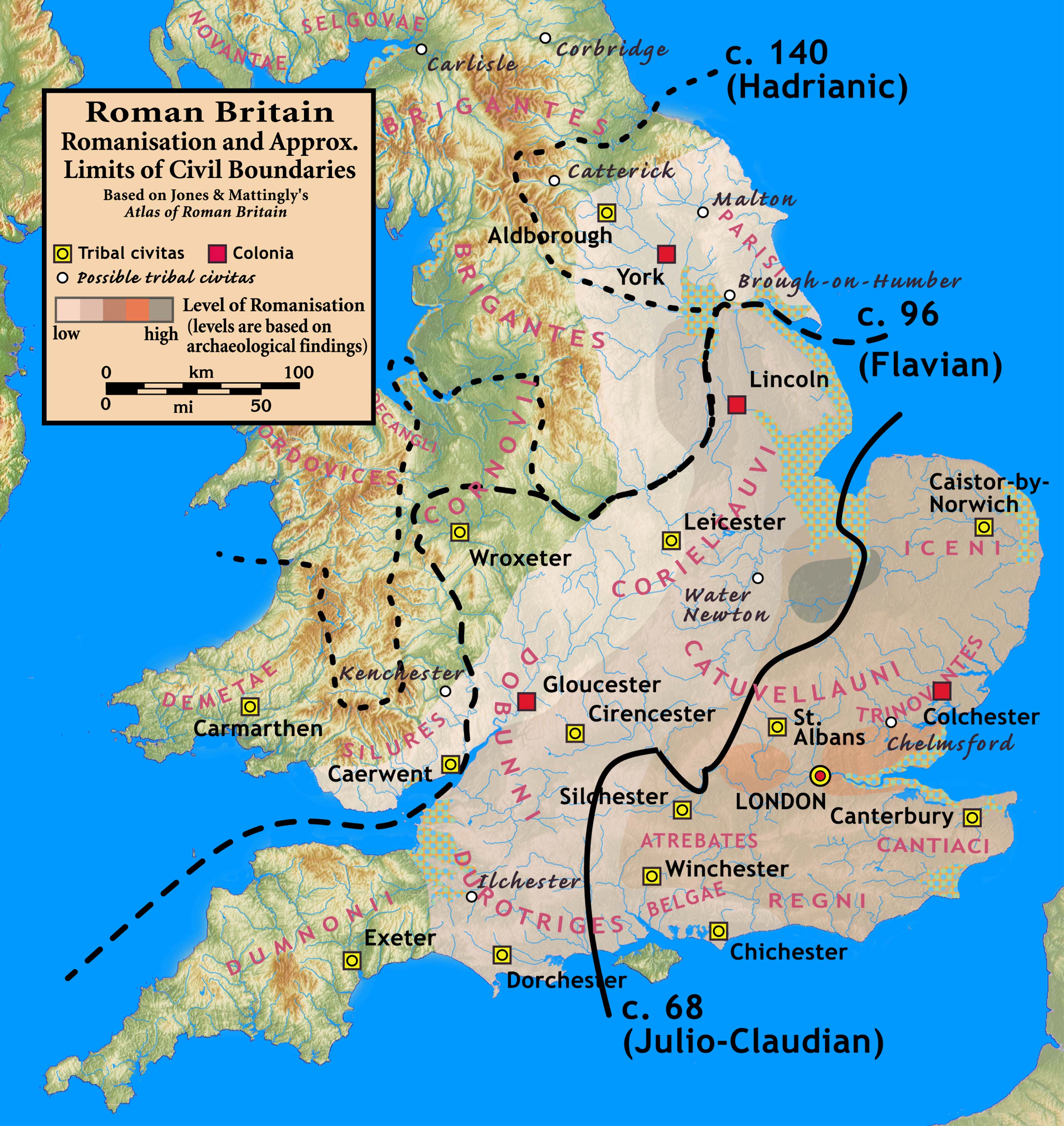|
Gwrtheyrn
Vortigern (; owl, Guorthigirn, ; cy, Gwrtheyrn; ang, Wyrtgeorn; Old Breton: ''Gurdiern'', ''Gurthiern''; gle, Foirtchern; la, Vortigernus, , , etc.), also spelled Vortiger, Vortigan, Voertigern and Vortigen, was a 5th-century warlord in Britain, known perhaps as a king of the Britons or at least connoted as such in the writings of Bede and Gildas. His existence is contested by scholars and information about him is obscure. He may have been the "superbus tyrannus" said to have invited Hengist and Horsa to aid him in fighting the Picts and the Scots, whereupon they revolted, killing his son in the process and forming the Kingdom of Kent. It is said that he took refuge in North Wales, and that his grave was in Dyfed or the Llŷn Peninsula. Gildas later denigrated Vortigern for his misjudgement and also blamed him for the loss of Britain. He is cited at the beginning of the genealogy of the early Kings of Powys. Medieval accounts Gildas The 6th-century cleric and h ... [...More Info...] [...Related Items...] OR: [Wikipedia] [Google] [Baidu] |
Kingdom Of Powys
The Kingdom of Powys ( cy, Teyrnas Powys; la, Regnum Poysiae) was a Welsh successor state, petty kingdom and principality that emerged during the Middle Ages following the end of Roman rule in Britain. It very roughly covered the northern two-thirds of the modern county of Powys and part of today's English West Midlands (see map). More precisely, and based on the Romano-British tribal lands of the Ordovices in the west and the Cornovii in the east, its boundaries originally extended from the Cambrian Mountains in the west to include the modern West Midlands region of England in the east. The fertile river valleys of the Severn and Tern are found here, and this region is referred to in later Welsh literature as "the Paradise of Powys" (an epithet retained in Welsh for the modern UK county). Name The name Powys is thought to derive from Latin ''pagus'' 'the countryside' and ''pagenses'' 'dwellers in the countryside', also the origins of French "pays" and English "peasant". ... [...More Info...] [...Related Items...] OR: [Wikipedia] [Google] [Baidu] |
King Of The Britons
The title King of the Britons ( cy, Brenin y Brythoniaid, la, Rex Britannorum) was used (often retrospectively) to refer to the most powerful ruler among the Celtic Britons, both before and after the period of Roman Britain up until the Norman invasion of Wales and the Norman conquest of England. Britons were the Brittonic languages, Brittonic-speaking (ancestral language of Welsh language, Welsh) peoples of what is now Wales, England and Scottish Lowlands, southern Scotland. The Britons are the ethnic ancestors of the Welsh people, Welsh in addition to the Cornish people, Cornish and Bretons. During the House of Normandy, Norman and House of Plantagenet, Plantagenet periods, only Wales (or parts thereof) remained under Brittonic rule in Britain and the term "Britons" (''Brythoniaid'', ''Britaniaid'', ''Brutaniaid'') was used in Britain to mean the Welsh people (''Cymry'' in modern Welsh language, Welsh). This, and the diminishing power of the Welsh rulers relative to the King ... [...More Info...] [...Related Items...] OR: [Wikipedia] [Google] [Baidu] |
Llŷn Peninsula
The Llŷn Peninsula ( cy, Penrhyn Llŷn or , ) extends into the Irish Sea from North West Wales, south west of the Isle of Anglesey. It is part of the historic county of Caernarfonshire, and historic region and local authority area of Gwynedd. Much of the eastern part of the peninsula, around Criccieth, may be regarded as part of Eifionydd rather than Llŷn, although the boundary is somewhat vague. The area of Llŷn is about , and its population is at least 20,000. Historically, the peninsula was travelled by pilgrims en route to Bardsey Island (Welsh: ''Ynys Enlli''), and its relative isolation has helped to conserve the Welsh language and culture, for which the locality is now famous. This perceived remoteness from urban life has lent the area an unspoilt image which has made Llŷn a popular destination for both tourists and holiday home owners. Holiday homes remain contentious among locals, many of whom are priced out of the housing market by incomers. From the 1970s to the 199 ... [...More Info...] [...Related Items...] OR: [Wikipedia] [Google] [Baidu] |
Vortigern And Rowena
''Vortigern and Rowena'', or ''Vortigern, an Historical Play'', is a play that was touted as a newly discovered work by William Shakespeare when it first appeared in 1796. It was eventually revealed to be a Shakespeare hoax, the product of prominent forger William Henry Ireland. Its first performance was on 2 April 1796, when it was ridiculed by the audience. Its titular protagonists, Vortigern and Rowena, are figures from Britain's traditional history. History Ireland had produced several earlier documents he claimed represented the writings of Shakespeare, but ''Vortigern and Rowena'' was the first play he attempted. He shortly followed it with a forged ''Henry II''. He had announced his "discovery" of the lost play as early as 26 December 1794 but did not show his father a manuscript until March 1795. He also provided a purported correspondence between Shakespeare and a printer explaining why the play was unpublished, as well as a deed accounting for how it came to be in han ... [...More Info...] [...Related Items...] OR: [Wikipedia] [Google] [Baidu] |
Foederati
''Foederati'' (, singular: ''foederatus'' ) were peoples and cities bound by a treaty, known as ''foedus'', with Rome. During the Roman Republic, the term identified the ''socii'', but during the Roman Empire, it was used to describe foreign states, client kingdoms or barbarian tribes to which the empire provided benefits in exchange for military assistance. The term was also used, especially under the empire, for groups of "barbarian" mercenaries of various sizes who were typically allowed to settle within the empire. Roman Republic In the early Roman Republic, ''foederati'' were tribes that were bound by a treaty (''foedus'' ) to come to the defence of Rome but were neither Roman colonies nor beneficiaries of Roman citizenship (''civitas''). Members of the Latini tribe were considered blood allies, but the rest were federates or ''socii''. The friction between the treaty obligations without the corresponding benefits of Romanity led to the Social War between the Romans, with a ... [...More Info...] [...Related Items...] OR: [Wikipedia] [Google] [Baidu] |
Usurper
A usurper is an illegitimate or controversial claimant to power, often but not always in a monarchy. In other words, one who takes the power of a country, city, or established region for oneself, without any formal or legal right to claim it as one's own. Usurpers can rise to power in a region by often unexpected physical force, as well as through political influence and deceit. Etymology The word originally came from the Latin word ''usurpare'' (“to seize", "to take forcefully" or "to use”). Politics The Greeks had their own conception of what usurpers were, calling them tyrants. In the ancient Greek usage, a tyrant (''tyrannos''/''τύραννος'' in Greek) was an individual who rose to power via unconstitutional or illegitimate means, usually not being an heir to an existing throne. Such individuals were perceived negatively by political philosophers such as Socrates, Plato and Aristotle. Usurpers often try to legitimize their position by claiming to be a descendant ... [...More Info...] [...Related Items...] OR: [Wikipedia] [Google] [Baidu] |
Anglo-Saxons
The Anglo-Saxons were a Cultural identity, cultural group who inhabited England in the Early Middle Ages. They traced their origins to settlers who came to Britain from mainland Europe in the 5th century. However, the ethnogenesis of the Anglo-Saxons happened within Britain, and the identity was not merely imported. Anglo-Saxon identity arose from interaction between incoming groups from several Germanic peoples, Germanic tribes, both amongst themselves, and with Celtic Britons, indigenous Britons. Many of the natives, over time, adopted Anglo-Saxon culture and language and were assimilated. The Anglo-Saxons established the concept, and the Kingdom of England, Kingdom, of England, and though the modern English language owes somewhat less than 26% of its words to their language, this includes the vast majority of words used in everyday speech. Historically, the Anglo-Saxon period denotes the period in Britain between about 450 and 1066, after Anglo-Saxon settlement of Britain, th ... [...More Info...] [...Related Items...] OR: [Wikipedia] [Google] [Baidu] |
Celtic Britons
The Britons ( *''Pritanī'', la, Britanni), also known as Celtic Britons or Ancient Britons, were people of Celtic language and culture who inhabited Great Britain from at least the British Iron Age and into the Middle Ages, at which point they diverged into the Welsh, Cornish and Bretons (among others). They spoke the Common Brittonic language, the ancestor of the modern Brittonic languages. The earliest written evidence for the Britons is from Greco-Roman writers and dates to the Iron Age.Koch, pp. 291–292. Celtic Britain was made up of many tribes and kingdoms, associated with various hillforts. The Britons followed an Ancient Celtic religion overseen by druids. Some of the southern tribes had strong links with mainland Europe, especially Gaul and Belgica, and minted their own coins. The Roman Empire conquered most of Britain in the 1st century, creating the province of Britannia. The Romans invaded northern Britain, but the Britons and Caledonians in the north ... [...More Info...] [...Related Items...] OR: [Wikipedia] [Google] [Baidu] |
Ecclesiastical History Of The English People
The ''Ecclesiastical History of the English People'' ( la, Historia ecclesiastica gentis Anglorum), written by Bede in about AD 731, is a history of the Christian Churches in England, and of England generally; its main focus is on the conflict between the pre-Schism Roman Rite and Celtic Christianity. It was composed in Latin, and is believed to have been completed in 731 when Bede was approximately 59 years old. It is considered one of the most important original references on Anglo-Saxon history, and has played a key role in the development of an English national identity. Overview The ''Historia ecclesiastica gentis Anglorum'', or ''An Ecclesiastical History of the English People'' is Bede's best-known work, completed in about 731. The first of the five books begins with some geographical background and then sketches the history of England, beginning with Julius Caesar's invasion in 55 BC. A brief account of Christianity in Roman Britain, including the martyrdom of St Alban ... [...More Info...] [...Related Items...] OR: [Wikipedia] [Google] [Baidu] |
Roman Empire
The Roman Empire ( la, Imperium Romanum ; grc-gre, Βασιλεία τῶν Ῥωμαίων, Basileía tôn Rhōmaíōn) was the post-Republican period of ancient Rome. As a polity, it included large territorial holdings around the Mediterranean Sea in Europe, North Africa, and Western Asia, and was ruled by emperors. From the accession of Caesar Augustus as the first Roman emperor to the military anarchy of the 3rd century, it was a Principate with Italia as the metropole of its provinces and the city of Rome as its sole capital. The Empire was later ruled by multiple emperors who shared control over the Western Roman Empire and the Eastern Roman Empire. The city of Rome remained the nominal capital of both parts until AD 476 when the imperial insignia were sent to Constantinople following the capture of the Western capital of Ravenna by the Germanic barbarians. The adoption of Christianity as the state church of the Roman Empire in AD 380 and the fall of the Western ... [...More Info...] [...Related Items...] OR: [Wikipedia] [Google] [Baidu] |
Romano-British Culture
The Romano-British culture arose in Britain under the Roman Empire following the Roman conquest in AD 43 and the creation of the province of Britannia. It arose as a fusion of the imported Roman culture with that of the indigenous Britons, a people of Celtic language and custom. Scholars such as Christopher Snyder believe that during the 5th and 6th centuries – approximately from 410 when the Roman legions withdrew, to 597 when St Augustine of Canterbury arrived – southern Britain preserved an active sub-Roman culture that survived the attacks from the Anglo-Saxons and even used a vernacular Latin when writing. Arrival of the Romans Roman troops, mainly from nearby provinces, invaded in AD 43, in what is now part of England, during the reign of Emperor Claudius. Over the next few years the province of Britannia was formed, eventually including the whole of what later became England and Wales and parts of Scotland.Kinder, H. & Hilgemann W. ''The Penguin Atlas of World ... [...More Info...] [...Related Items...] OR: [Wikipedia] [Google] [Baidu] |
The Reckoning Of Time
''The Reckoning of Time'' ( la, De temporum ratione) is an Anglo-Saxon era treatise written in Medieval Latin by the Northumbrian monk Bede in 725. The treatise includes an introduction to the traditional ancient and medieval view of the cosmos, including an explanation of how the spherical Earth influenced the changing length of daylight, of how the seasonal motion of the Sun and Moon influenced the changing appearance of the new moon at evening twilight, and a quantitative relation between the changes of the tides at a given place and the daily motion of the Moon. ''The Reckoning of Time'' describes the principal ancient calendars, including those of the Hebrews, the Egyptians, the Romans, the Greeks, and the Anglo-Saxons.Wallis (2004:41-54;281–287 The focus of ' was calculation of the date of Easter, for which Bede described the method developed by Dionysius Exiguus. ' also gave instructions for calculating the date of the Easter full moon, for calculating the motion of ... [...More Info...] [...Related Items...] OR: [Wikipedia] [Google] [Baidu] |








